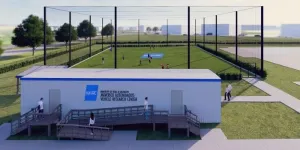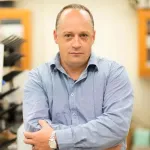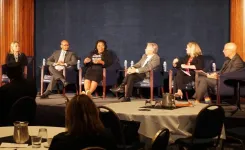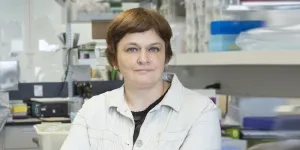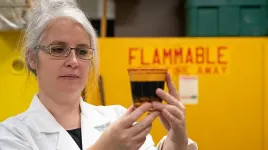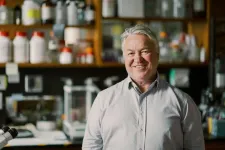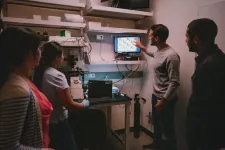(Press-News.org) As Rohit Velankar, now a senior at Fox Chapel Area High School, poured juice into a glass, he could feel that the rhythmic glug, glug, glug was flexing the walls of the carton.
Rohit pondered the sound, and wondered if a container’s elasticity influenced the way its fluid drained. He initially sought the answer to his question for his science fair project, but it spiraled into something more when he teamed up with his father, Sachin Velankar, a professor of chemical and petroleum engineering at the University of Pittsburgh Swanson School of Engineering.
They set up an experiment in the family’s basement and their findings were published in their first ever paper together as father and son.
“I became quite invested in the project myself as a scientist,” Sachin Velankar said. “We agreed that once we started on the experiments, we’d need to take it to completion.”
The Science Behind the Glug
Rohit’s first experiments found deli containers with rubber lids emptied faster than those with plastic lids.
“Glugging occurs because the exiting water tends to reduce the pressure within the bottle,” Velankar said. “When the container is highly flexible, like the bags that hold IV fluids or boxed wine, the container may be able to dispense fluid without glugging. But there are other types of flexible bottles out there, so surely their elasticity must affect its draining.”
They created their own ideal acrylic bottles with rubber lids using tools available at Fox Chapel Area High School’s makerspace. A sensor was placed near a hole at the bottom of each bottle to measure the pressure oscillations with each glug. The Velankars were able to simulate flexibility by adjusting the diameter of the hole, confirming that flexible bottles drain faster, but with bigger, more infrequent glugs.
The paper, “Soft bottles drain faster but glug slower,” was recently published in the journal Physics of Fluids (DOI: 10.1063/5.0217553).
END
The glug of it all
2024-09-10
ELSE PRESS RELEASES FROM THIS DATE:
UTA to build netted drone facility in Fort Worth
2024-09-10
The University of Texas at Arlington is expanding its research and innovation capabilities by building a $2.3 million, state-of-the-art outdoor netted drone facility. The Maverick Autonomous Vehicle Research Center (MAVRC) will be located at the UT Arlington Research Institute (UTARI) in Fort Worth, with a planned completion date of January 2025.
“MAVRC will significantly and positively impact UTA’s presence in the region by supporting the university-industry-government-community ecosystem focused ...
Streamlining energy regulations on Native American reservations could help alleviate poverty
2024-09-10
MADISON–Land was once set aside as Native American reservations because it was undesirable and low in resources, but now interested Native Americans may have economic leverage in the growing industry of clean energy. A team of researchers led by UW–Madison professors Dominic Parker and Sarah Johnston quantified the economic potential of wind and solar energy projects on these lands and discussed the regulatory barriers for tribes wishing to tap into it.
“This is the first comprehensive ...
UT microbiologist Wilhelm honored as Fellow of the Royal Society of Canada
2024-09-10
Steven Wilhelm joins a distinguished roster this year with his election as a fellow of the Royal Society of Canada (RSC) Academy of Science. This recognition is the RSC’s highest honor in areas of arts, social sciences, humanities, and science.
“The RSC inducts fellows to help them build a better future in Canada and the world. As a native Canadian, this honor is the pinnacle of what I could have hoped for in my career,” said Wilhelm, the Kenneth and Blaire Mossman Professor in UT’s Department of Microbiology. “It also provides an opportunity for me to work with my collaborators ...
NCCN Policy Summit explores how to build an inclusive cancer center workplace culture that better serves everybody
2024-09-10
WASHINGTON, D.C. [September 10, 2024] — The National Comprehensive Cancer Network® (NCCN®) held an oncology policy summit today in Washington, D.C., focused on Advancing Diversity, Equity, and Inclusion in the Cancer Workforce. The event featured a keynote address from Tiffany Wallace, PhD, Branch Director, Disparities Research Branch, National Cancer Institute (NCI) Center for Cancer Health Equity. Panel discussions focused on how to establish and prioritize a culture of diversity, equity, inclusion, and belonging and maintain the commitment through a changing policy landscape. A series of ...
Games, puzzles and reading can slow cognitive decline in the elderly — even in those with mild cognitive impairment
2024-09-10
By Ann Kellett, Texas A&M University School of Public Health
The aging process can lead to diminished cognitive functioning for older adults. In addition, about 10 percent of people previously diagnosed with mild cognitive impairment develop Alzheimer’s disease or other forms of dementia every year.
Although a few studies have found that activities such as putting together jigsaw puzzles can protect against cognitive aging, the benefits of these activities in preventing or postponing cognitive ...
An antidiabetic helps the immune system recognize reservoirs of HIV
2024-09-10
Researchers at Université de Montréal’s affiliated hospital research centre, the CRCHUM, say the discovery could help lessen and even eliminate viral loads in people undergoing antiretroviral therapy.
Metformin, a drug used to treat type 2 diabetes, could help deplete the viral reservoir and eliminate it entirely in people living with HIV who receive antiretroviral therapy, Canadian researchers say in a new study.
In 2021, a team led by immunologist Petronela Ancuta of Université de Montréal’s affiliated hospital research centre, ...
Department of Energy grant advances clean energy studies
2024-09-10
Dr. Berna Hascakir, professor in the Harold Vance Department of Petroleum Engineering at Texas A&M University, was selected as part of a $17 million grant from the U.S. Department of Energy’s (DOE) Office of Fossil Energy and Carbon Management. The investment will support university-led projects that advance decarbonization and net-zero greenhouse gas emissions.
In partnership with Texas A&M, Texas Tech University, Howard University, and the University at Buffalo, this initiative unites three minority-serving ...
Finding the right path(way) to reduce fat accumulation in the liver
2024-09-10
Using a novel stem cell platform, a team of Medical University of South Carolina researchers has identified a pathway that could be targeted by drugs to reduce fat accumulation in patients with a common form of fatty liver disease known as metabolic dysfunction-associated steatotic liver disease, or MASLD. The MUSC team was led by Stephen Duncan, Ph.D., SmartState Endowed Chair in Regenerative Medicine at MUSC, and Caren Doueiry, an M.D., Ph.D. candidate in Duncan’s laboratory. The team reports its findings in the International Journal of Molecular Sciences.
Almost a quarter of Americans have MASLD, formerly known as non-alcoholic fatty liver disease. It ...
MicroDicer and MicroGrater make quick work of tumor dissection
2024-09-10
As fascinating as it is to work in a modern biology lab, in many cases a lot of repetitive, detailed work is necessary before the research can start. For example, cancer researchers are now capable of using hundreds or even thousands of small, lab-grown tumor samples – known as organoids – to test multiple cancer therapies, including immunotherapies, at once.
To produce organoids, researchers often need to mince a fresh tumor into small pieces by hand, using scissors to snip, snip, snip the specimen down to submillimeter size. This dissection work is tedious and yet often done by skilled – and usually overqualified ...
Phase II study of taletrectinib shows clinically meaningful overall response and favorable safety in patients with ROS1+ non-small cell lung cancer
2024-09-10
(San Diego, Calif.--September 10, 2024, 10:35 a.m. PCT) – The ROS1 tyrosine kinase inhibitor (TKI) taletrectinib demonstrated high overall and intracranial responses, and a favorable safety profile with low incidence of neurologic adverse events in TKI-naive and TKI-pretreated patients with ROS1+ non-small cell lung cancer (NSCLC).
These results were presented today at the International Association for the Study of Lung Cancer 2024 World Conference on Lung Cancer by Dr. Geoffrey Liu, from Princess Margaret Cancer Centre, ...
